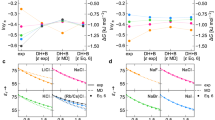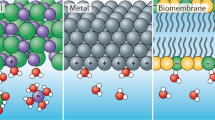Abstract
Jones and Ray1 have recently found that on adding a salt to water the surface tension at first decreases, then passes through a minimum and finally at concentrations above about 0.001N increases with increase of concentration. The interionic attraction theory of surface tension developed by Wagner2 and Onsager3 on the basis of the Debye solution theory and the principles of electrostatics requires, however, the slope of the surface tension - concentration curve always to be positive and greater at the lower concentrations. The accurate results of Jones and Ray are thus seen to be in complete disagreement with theory.
This is a preview of subscription content, access via your institution
Access options
Subscribe to this journal
Receive 51 print issues and online access
$199.00 per year
only $3.90 per issue
Buy this article
- Purchase on Springer Link
- Instant access to full article PDF
Prices may be subject to local taxes which are calculated during checkout
Similar content being viewed by others
References
Jones, Grinnell, and Ray, W. A., J. Amer. Chem. Soc., 59, 187 (1937).
Wagner, C., Phys. Z., 25, 474 (1924).
Onsager, L., and Samaras, N. N. T., J. Chem. Phys., 2, 528 (1934).
Author information
Authors and Affiliations
Rights and permissions
About this article
Cite this article
DOLE, M. Surface Tension of Strong Electrolytes. Nature 140, 464–465 (1937). https://doi.org/10.1038/140464b0
Issue Date:
DOI: https://doi.org/10.1038/140464b0
This article is cited by
Comments
By submitting a comment you agree to abide by our Terms and Community Guidelines. If you find something abusive or that does not comply with our terms or guidelines please flag it as inappropriate.



